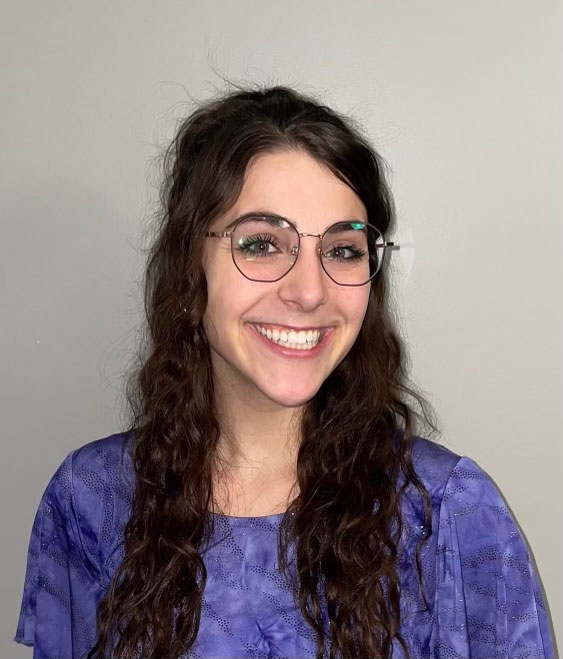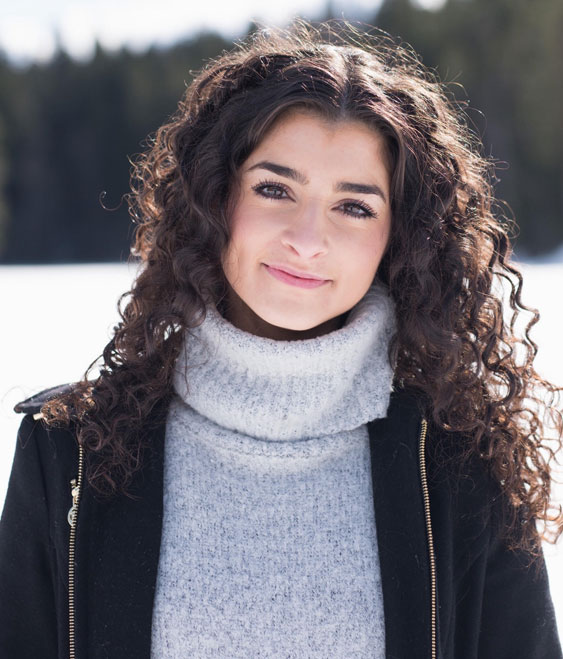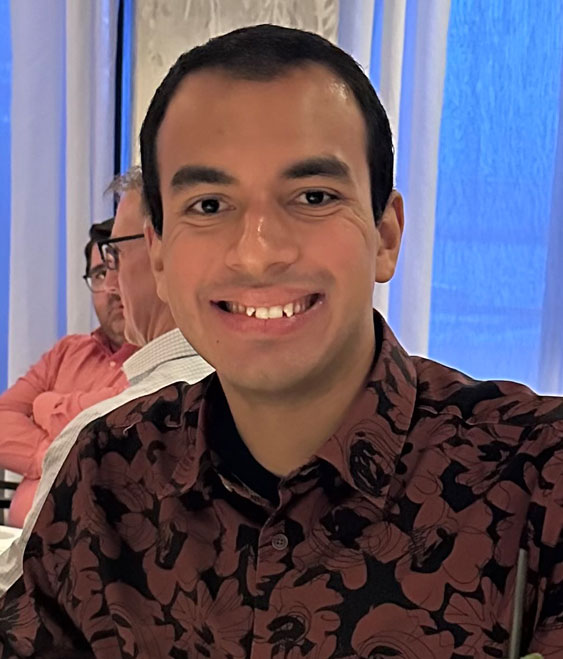From advocating for mental health and conducting research in the Department of Psychiatry, to directing programming in the Office of Multicultural Affairs, those of Arab American heritage are engaged with seemingly every facet of Case Western Reserve University.
In recognition of Arab American Heritage Month, which takes place annually in April, The Daily is celebrating the accomplishments and experiences of three Arab American members of the CWRU community. Discover more about their experiences at the university—and learn how their heritage has impacted their lives.
Answers have been lightly edited for clarity and length.
Salayna Abdallah

Master’s student, clinical psychology
Salayna Abdallah’s culture and ethnicity have had profound impacts on her life. As an Arab American, she understands people from diverse cultures and backgrounds respond differently to various forms of care—and as a clinical psychology master’s student at CWRU, she’s been able to put this understanding to practice.
“My research team produced amazing work in this area while participating in community outreach events and targeting underrepresented communities through meaningful interactions, culturally responsive recruitment, and research questions that consider the health of individuals of diverse ethnic, cultural and racial backgrounds,” Abdallah explained. “I plan to continue to incorporate these principles in my own research and future career.”
Read on to learn more about Abdallah.
Q: Where is your family from? Where did you grow up?
A: My family is from Beirut, Lebanon. My mother and her family moved to the United States in 1979. I grew up in Cleveland, Ohio.
Q: Why did you choose to study at CWRU?
A: I chose to do my clinical research practicum at CWRU because of the amazing research opportunities and experiences I would obtain from working and studying at such a reputable university.
Q: What led you to study clinical psychology?
A: I chose clinical psychology because my long-term goals involve breaking down barriers and stigma surrounding mental health treatment, including those about medication. For example, if someone’s heart requires medication, they are more likely to seek treatment without stigma or shame—unlike mental health treatment, which unfortunately often carries deep shame and severe stigma. The brain is an organ, just like the heart. I hope to raise awareness and understanding of these misconceptions surrounding mental health and behavioral medicine.
Q: What do you think the campus community should know about Arab American Heritage Month or Arab American heritage in general?
A: Arab Americans, like other collectivistic cultures, are people who value community, family, and culture. Specifically, Arab hospitality is exceptional, and the food is amazing! However, following the horrific events on 9/11, many Arab Americans, especially Muslim Arabs, have faced discrimination. America is a melting pot, so acknowledging potential bias is an important step in accepting and embracing diverse communities and individuals.
Q: Why do you believe it’s important to celebrate Arab American Heritage Month?
A: I believe Arab-American Heritage Month is a wonderful step toward shifting the narrative surrounding Arab-Americans, portraying them as individuals who are part of a vibrant and beautiful culture.
Mariah Salloum

Assistant director of student programming and operations in the Office of Multicultural Affairs
Half Lebanese by heritage, Mariah Salloum has had to grapple with the complexities of identity in a society that often struggles to recognize the validity of mixed backgrounds.
Over the years, Salloum has worked hard to learn about her roots, as she never met her grandfather, who was a Lebanese immigrant, and her grandmother died when Salloum was 9 years old.
“My story is unique because of the way that I continue to fight to find out more about my heritage—both inside and outside of my family,” Salloum noted. “I continue to find bits and pieces of my culture in the things that I have been involved with.”
Read on to learn more about Salloum.
Q: Where is your family from? Where did you grow up?
A: I grew up in Concord Township, Ohio, but my roots stretch much further than that. My jidoo (grandpa) on my father’s side was born in Lebanon. My sitoo (grandma) was first generation here in the United States and her siblings were born in Lebanon. They both spoke Arabic and were very in touch with their Lebanese culture here. They originally lived in Cleveland, where there is still a large Lebanese community. However, they later moved to Mentor, Ohio, because my jidoo got a job in a factory there.
Q: Why are you passionate about your role at CWRU?
A: I am passionate about my role here at CWRU because of the myriad of people who I have the honor of getting to know. I just started working at CWRU in January, but I have already built so many meaningful relationships here, many of which are rooted in shared admiration for other cultures and languages. I am a student of life, and it excites me to continue learning about my own culture and the cultures of others. We have a lot of students who come to visit our office from all around the world. What’s interesting is that the Arabic language and culture are not just from one specific place or country. In fact, it spans farther than you may think.
Q: What has your career path looked like so far?
A: When I was a student at John Carroll University, I received a life-changing scholarship to study abroad in Madrid, Spain. After I graduated, I moved back to various cities around Spain four more times to teach English as a second language to young children there. Besides sharpening my Spanish language skills and eventually becoming fluent, I found something in Spain that I was not expecting, which was the heavy Northern African history and influence in the country. Those Northern African peoples shared many cultural and religious elements with Arabs, including the Arabic language and Islamic customs, which is seen in many historical sites in Spain. After experiencing this, I felt a much deeper connection to my Arab roots. I moved back from Spain in July of 2023, and I started working here at CWRU in January of 2024.
Q: What do you think the campus community should know about Arab American Heritage Month or Arab American heritage in general?
A: I think I have a unique perspective on Arab American Heritage Month because I am not someone who is “100%” Lebanese. I have Lebanese and Sicilian heritage. I have experienced occasional pushbacks from others because being mixed is sometimes seen as a “less valid” experience. I’d like others to know that being an Arab American is less about the percentages and more about how you educate yourself and embrace your culture(s).
Haddy Dardir

Undergraduate student in psychology
Although he was born in Cleveland, both sides of Haddy Dardir’s family are from Alexandria, Egypt. Growing up, he struggled to learn Arabic because of a lack of resources, and as a result, he couldn’t have fulfilling conversations with his relatives in Egypt. Things finally took a turn for the better last summer when he started taking private Arabic lessons.
“With these lessons, I also hope to gain something that I’ve always advocated for as a mental health advocate and member of the Steve Fund’s Youth Ambassador Board: A stronger connection with my extended family in Egypt that can only be achieved through Arabic fluency,” said Dardir. The Steve Fund is a national nonprofit dedicated to advocating for the mental health of young people of color.
Read on to learn more about Dardir.
Q: Why did you choose to study at CWRU?
A: I chose to study at CWRU for a variety of reasons. While parental encouragement was definitely a factor, I also didn’t feel ready to leave Ohio because I knew there was so much more I could learn about Cleveland and all the educational opportunities it offers after living in a nearby high-income suburb for almost 10 years. Committed to becoming a physician since my last year of high school, I wanted to attend CWRU to take advantage of all the wonderful opportunities it has for pre-meds as well.
Q: Why did you choose to study psychology?
A: As an aspiring public health physician, I decided to study psychology because it often blurs the line between the biological and social determinants of health, and studying how people think and behave is especially relevant to medicine. I’m also minoring in social work because of its heavy overlap with public health and CWRU having some of the best social work faculty in the country; social justice because of my passion for uplifting others who are struggling as a result of their circumstances; and chemistry because of its strong connection to holistic health and wellness.
Q: What do you think the campus community should know about Arab American Heritage Month or Arab American heritage in general?
A: I think the campus community should know that Arab American heritage is a gradient that includes a wide variety of cultures and ethnicities because of Arabic’s influence across multiple regions as a shared language. When I call myself Arab American as someone of Egyptian heritage, I’m sometimes confronted with the rebuttal that only a small percentage of Egyptians have ethnic roots in the Arab Peninsula and that most Egyptians are actually of North African descent. Despite my culture’s differences with the Middle East, however, I find it appropriate to combine us into a single racial group and collectively call ourselves Arab Americans because the Arabic language allows us to be united in our identities while also respecting what makes each of us unique.
Q: Why do you believe it’s important to celebrate Arab American Heritage Month?
A: Simply put, I believe it’s important to celebrate Arab American Heritage Month because Arab Americans have distinct customs, traditions, and struggles that deserve a celebration. As a result of these distinctions, Arab Americans have recently received their own racial category for the 2030 Census via the category “Middle Eastern or North African (MENA),” making the celebration of Arab American heritage month more relevant than ever and allowing it to stay relevant for a very long time.
